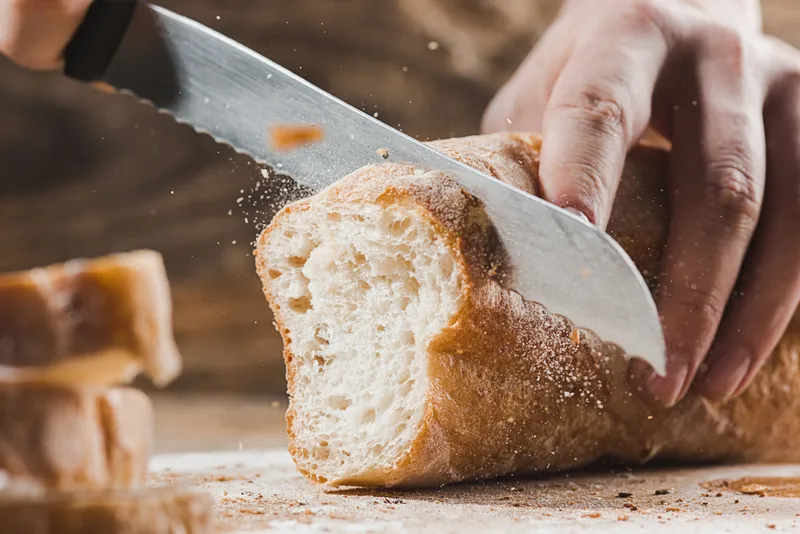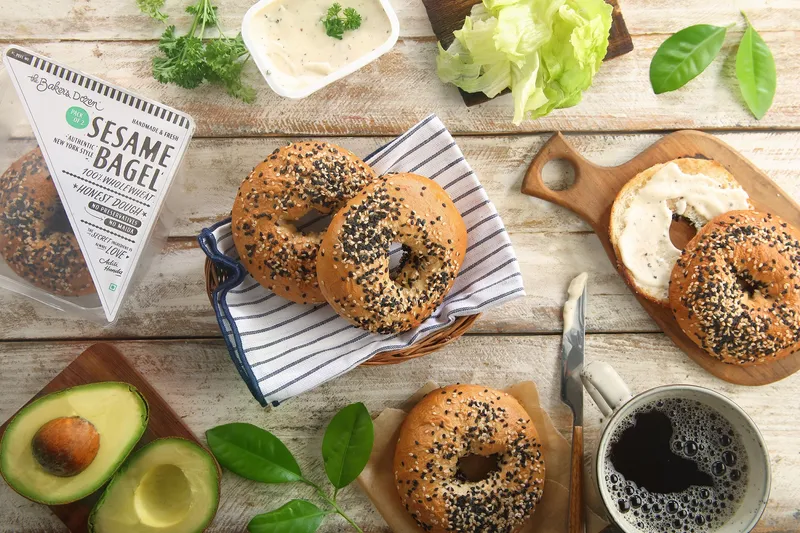Baking for the win: Chef Aditi Handa on building a Rs 6.5 Cr bread business
Entrepreneur and Chef Aditi Handa traces her journey — from building The Baker’s Dozen from scratch to expanding it to a national bread brand.
If you ask Michelin star chef John Wood for the one food he would choose to eat for the rest of his life, the Executive Chef at Burj Al Arab said, “Bread, for the versatility it offers.”
And rightly so. Soft in the middle and crusty on the outside, a good loaf of bread is the most satisfying of all foods, irrespective of who you ask.

Source: Shutterstock
When 36-year-old Chef Aditi Handa got some flour, water, yeast, and salt to shape one of her first sourdough — a French Pain Aux Cereales, the founder of , says, “I knew that moment that baking bread was the purpose of my life.”
Armed with two diplomas — International Bread Baking from International Culinary Institute, New York, and Patisserie from Le Cordon Bleu, Paris — Aditi founded the artisan bakery out of a small kitchen in Mumbai in 2012, with three other bakers.
“We were amongst the first few artisan bakeries that offered authentic and honest products,” Aditi says.
In the first year, The Baker’s Dozen sold 1,000 units of sourdough. In five years, the number shot up to one lakh. Today, it sells at least three-lakh units of sourdough annually.

Chef Aditi Handa, Founder of The Baker's Dozen
“The pandemic has put the spotlight on sourdough bread with home kitchens abuzz with more activity than ever before. But my purpose is deeper than giving it recognition on the Instagram feed,” Aditi says.
The chef is against India’s obsession with white bread, and she is on a mission to draw the attention back to the goodness of sourdough bread and put it on the dinner table as an essential commodity.
Passion for the dough
Aditi says, “Bread is a very simple product made from very basic ingredients like flour, water, yeast, and salt. But what is amazing is how there are so many different ways these ingredients can come together to make a comforting loaf of bread...In cakes, a baker can cover up some errors through icing and fondant. There is no escape in bread. Once your dough is in the oven, a baker cannot do anything to it. It is your hand skills that decide how the bread will turn out eventually.”
She bonded with her husband Sneh Jain over their shared love for entrepreneurship and the excitement to start a business. “Food was an area of passion for me and making a brand is what drives Sneh. The Baker’s Dozen was a perfect alignment for both our aspirations,” Aditi explains. An IIM Ahmedabad alum, Sneh currently leads The Baker’s Dozen as the Managing Director and Co-founder.
The startup moved its headquarters to Ahmedabad in 2019. Last year, it pioneered India’s first pandemic-ready 25,000 sq ft baking factory.
Today, The Baker’s Dozen has a team of 100 employees, including staff members at 24 outlets across six cities, and the factory.

Couple and co-founders of The Baker's Dozen Aditi Handa and Sneh Jain
The baking business
All products of The Baker’s Dozen are handmade at the manufacturing unit in Ahmedabad, maintaining the highest standards of hygiene and quality. Then on, the products are dispatched thrice, every week, to individual warehouses in the major cities.
The products are then delivered daily to The Baker’s Dozen stores, retail partners, and ecommerce partners. Doorstep deliveries to the customers take place through stores or partner channels.
Customers can also place orders on The Baker’s Dozen’s official website. It delivers around a 5-km radius, depending on the area the outlet is located. It is also listed on Zomato and Swiggy, and has partnered with Bigbasket, Milkbasket, and Supr Daily to facilitate delivery.
Its products are also placed on Nature’s Basket, Foodhall, Big Bazaar, Namdhari’s, Modern Bazaar, Le Marche, and other high-end general trade stores.
“While our aim is to get sourdough on every Indian dining table, we have ensured our pricing and product range attract both the aspirational middle class and the upper class,” Aditi explains.

Sesame Bagel by The Baker's Dozen
The Baker’s Dozen is charting its journey, helping customers — starting from the wholewheat sliced loaf and then going up to sourdough.
While the daily breads start from Rs 50, the starting price for sourdough bread is Rs 150, and that of bake-at-home mixes from Rs 300.
The Baker’s Dozen caters to about 75,000 monthly transacting customers, and the number has been increasing at about 300 percent year-on-year. It claimed that it generated Rs 6.5 crore in FY 2019-20, and is expecting to generate Rs 20 crore this year, with 10 percent EBITDA.
According to Aditi, the revenue has been increasing by 307 percent year-on-year.
Bootstrapping to success
Aditi and Sneh have bootstrapped The Baker’s Dozen with a total of Rs 60 million. The duo will be utilising Rs 30 million to open 50-branded and delivery-only outlets across 15 cities by the end of this year, and an equivalent balance towards capacity expansion via enhancements within its factory, equipment, and warehousing.
Having established its presence across Mumbai, Pune, Bengaluru, Delhi-NCR, Ahmedabad, Surat, Baroda, and Hyderabad, The Baker’s Dozen is now planning to first strengthen its current reach in these major cities, followed by aggressive expansion across other major metros and Tier I cities such as Kolkata, Chennai, Goa, Kochi, Jaipur, Chandigarh, and Lucknow.
According to Expert Market Research, the Indian bakery market stood at a value of nearly $7.60 billion last year. It was further estimated to grow at a CAGR of 8.5 percent between 2021 and 2026, reaching a value of $12.39 billion by 2026. Aditi says The Baker’s Dozen competes with local bakeries in each city, and with national mass brands including Britannia, Modern, and Bigbasket’s in-house brand Fresho, among others.

FitKneads product range by The Baker's Dozen
In the next three years, Aditi envisions The Baker’s Dozen to be present across 25 cities in India — metros, Tier I, and Tier II cities. “We plan to have 100 stores of our own, and more than 1,000 retail touchpoints,” Aditi says.
It is also looking to develop a separate B2B vertical to provide our products to premium institutional customers such as cloud kitchens, and hotel chains. The baking expert says that her favourite kind of bread is German sourdoughs.
“They have a very unique mix of taste and texture,” she explains.
Sharing ideas for aspiring bakers, Aditi suggests that one should “Start small and perfect their product with customer feedback in a limited area or locality...Do not be married to your product,” to become a successful foodpreneur.
Additionally, she says, one should always start with a limited range of SKUs, ones that are easy to perfect. “I started with 13-breads on our menu,” she reveals, “Go deep within a city first and become the category leader there, then expand geographically.”
Edited by Saheli Sen Gupta









